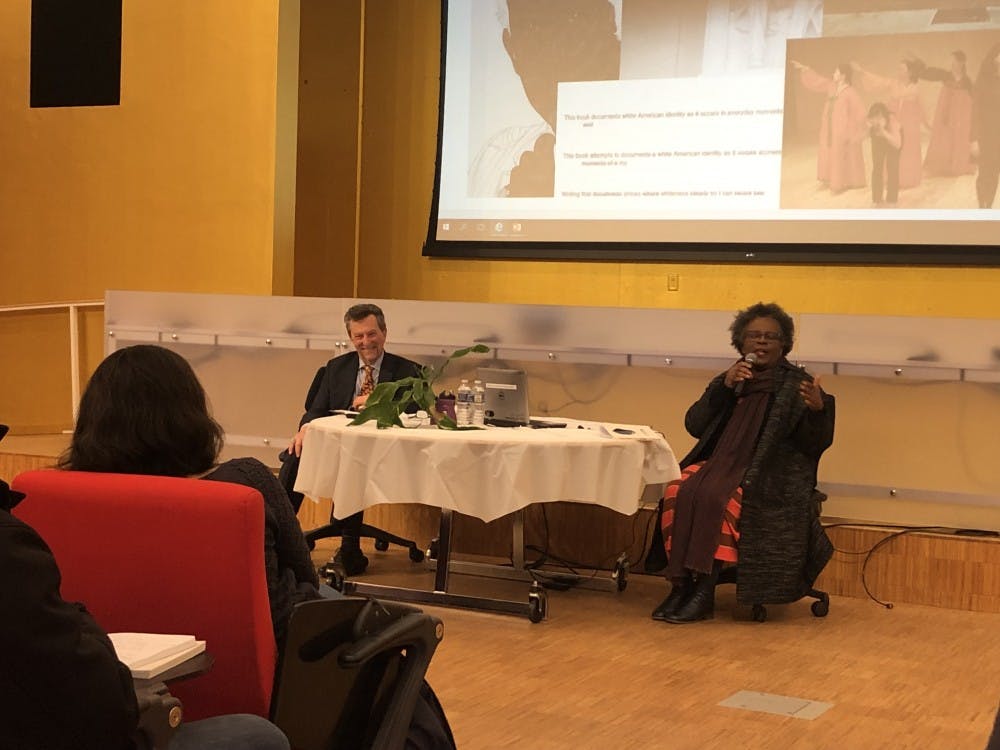Poet, playwright and essayist Claudia Rankine visited the University of Baltimore School of Law to read from and discuss her work, including Citizen: An American Lyric, a finalist for the 2014 National Book Awards. Marc Steiner of the podcast The Marc Steiner Show moderated the conversation.
The evening began with Rankine discussing the use of poetry in creating conversations about race and microaggressions. She explained that she wrote Citizen: An American Lyric during Hurricane Katrina and that poetry was a way of contending media discourse and carrying the voices of Hurricane Katrina’s black victims. She believes race was a large factor in the delayed rebuilding response after the disaster.
“People kept saying — and it really got on my nerves — ‘This is the United States of America. How could this happen?’” Rankine said. “And I was saying, it was because of the anti-black racism that lives and breathes in a micro level that makes Katrina possible.”
Rankine added that poetry felt like the right medium for her to tell this story.
“I started to interview black people about micro-aggression. I didn’t want to pretend to be in their position, I just wanted to say what they told me. They told me what happened but not how they felt. These sentences and their prose made lyric seemed like the right genre,” she said.
Rankine admitted that writing Citizen: An American Lyric did not come naturally to her, adding that it took her years to overcome both external and internal obstacles, which prevented her from publicly talking about racism in America.
“The thing I have to admit is I trained myself to start speaking,” Rankine said. “That’s the way we were raised. We were taught not to make people uncomfortable, even as they made us uncomfortable. You have to consciously break that barrier of that ‘good manners’ thing. Understand that calling things out is not you being rude; it’s you being truthful. Complicity is silence.”
Steiner countered this, suggesting that today’s political climate is changing. He gave the example of seeing both white and black people retweeting and liking racially progressive tweets online. Rankine disagreed and discussed a personal experience of racism at a recent dinner party.
“Only a few weeks ago at a dinner, as my husband and I were about to step out the door, one white person runs up to me and says, ‘You’re not scary at all,’” Rankine said. “It was her way of saying ‘I had a nice time sitting next to you.’ I am not making any of that up.”
According to Rankine, people should continue to speak out against racism even when they are not around minorities.
“White people ask me how they can become an ally,” she said. “When you hear these things and see these things, the racism should be upsetting you. White people really need to start being conscious about what is being said around them and being accountable without me being there.”
Rankine believes that racial progress is not possible until people come to terms with their own racism. However, Rankine noted that the cost of chipping away at microaggressions until the depth of their meaning is exposed is often at emotional expense of black people.
She cited the example of Dylann Roof, a white man who killed nine people at the Emanuel African Methodist Episcopal Church in 2015.
“Imagine if pictures of white supremacist and mass murderer Dylann Roof in the church basement were released,” she said. “It’s complicated because it would help us move more quickly. I think it helps people understand white terrorism and how it’s something that has coincided with our democracy. But it’s also up against the question of should black people have to look at the death of black people on the news?”
Larry Little Jr., a graduate student in Visual Communications and Media Design at the University of Baltimore, attended the event and said that he felt inspired by Rankine’s account on everyday racism. He hopes to broaden the platforms in which artists can discuss microaggressions.
“In the media there are often indirect messages that help shape the microaggressions Rankine was talking about,” he said. “I’ve been keeping all that in mind and just seeing the way these push-=backs against racism can be carried into TV and design. People who don’t necessarily read can still access the same message... It could be translated into mainstream media and reach a wider audience.”





